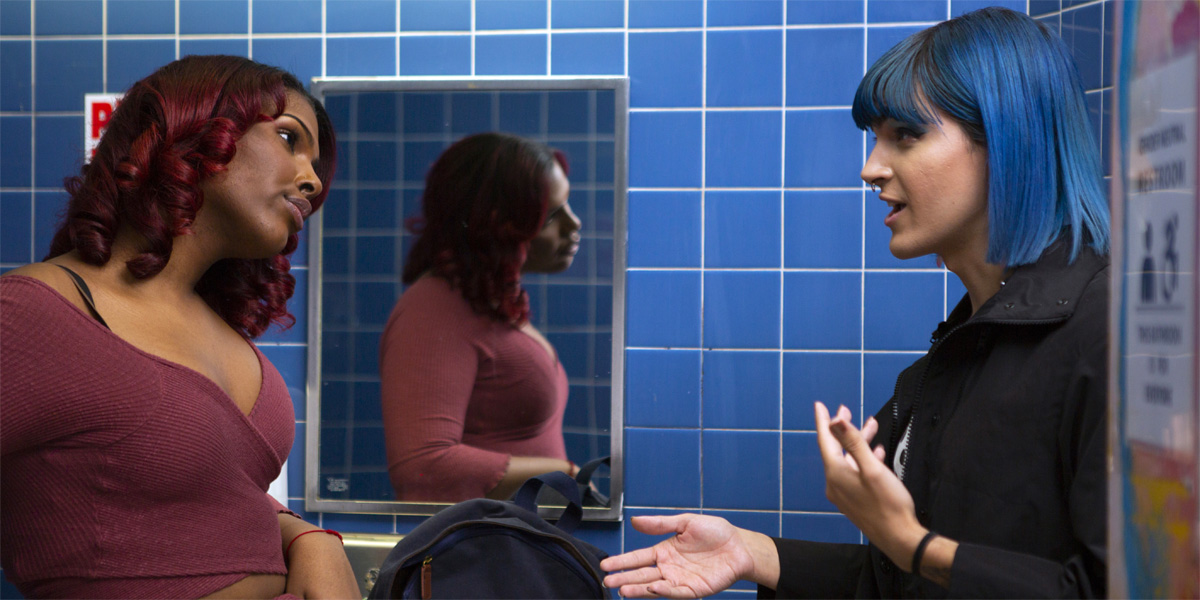One of my colleagues described the experience of being in a graduate program as a group of adults who all know that they’re right sitting in a room trying to convince everyone else that they’re wrong. It is and can be a time of great academic growth and a huge launching point for your career, but it can also be a lot. Professors often assign a book a week, you’re expected to work at a level that you might not be used to, and honestly one of the hardest parts is that you rarely receive encouragement from faculty members. It’s easy to get caught up in how difficult grad school is and to use that difficulty as an excuse to slack off on taking care of yourself, but the skills you build now will follow you into your career. It’s more important than ever to really make time and space for YOU, and I don’t just mean bubble baths. Here are nine tips to keep you at your sharpest, featuring over-the-top stock imagery.
Make your faculty work for you

Grad school doesn’t always feel like the best place to be confused, wrong, or unsure, but it’s better to feel those things now instead of when you’re a junior faculty member. When you don’t know something, ask your faculty for help; whether it’s figuring out what exactly a comprehensive exam is, or a concept in your discipline that you can’t quite figure out. Ask for help. Do it often, because your faculty members are there to teach you! It’s so easy to feel dumb when you don’t know something, but you are still a student, regardless of your other responsibilities, and students need to learn.
Find your grad school crew and lean on them

Whether it’s your cohort or another group of graduate students you organically get to know, it’s so important to have a group of people in school that you love and trust. These are the folks who will cheer you on when you don’t think you can read another three books in a week, who will help you strategize if/when you face discrimination, and will graduate and enter the workforce with you. These are people who can become lifetime friends and resources, and will offer you endless support (and hopefully laughs) during these tough years.
Find your non-school related thing

Just like it matters that you have people who intimately know what grad school is like for you, it’s important to have a thing that reminds you that grad school is not all there is. Maybe you go running a few times a week or find a queer dance night that you always go to, or learn how to bake or knit. Just find something that has nothing to do with your graduate school work, and fall in love with it. I started running last year — 30 minutes to an hour, a few times a week — I can honestly say that while I’m running, I don’t think about graduate school at all. And by not having school on my mind 24/7, I have a chance to look forward to getting back to work. I’m more excited about my classes, writing, and teaching when I feel like I’m a real person with interests, and not just some slave to research.
Take one day off each week

Not to get too religious on you, but even G-d didn’t work seven days a week, you know? You need time off. Yes, you need to work hard and challenge yourself and try new things, but you also need to rest. You’ll burn out so quickly if you spend every day workin. Take one day each week and do something fun to remind yourself that everything is not and cannot be about school.
Set boundaries

Especially as a queer student of color, I’ve found that I am a hot commodity on campus. People want to collaborate with me on projects, I look good on committees, and it’s all too easy for me to pull a week of 9 a.m. – 10 p.m. days. I have to set boundaries. For instance, I give myself 45 minutes a day to look at and respond to emails, period. I don’t do any work on Sunday mornings. I don’t take more than three evening meetings a week. My time and my presence matter, and so do yours. By setting boundaries, you’re making the best use of your time and making sure that you can be present for whatever you do commit to. It’s okay to say no sometimes, I promise you’ll still be able to get tenure if that’s what you want.
Use the university’s resources

I’m not just talking inter-library loan here (although inter-library loan is the greatest thing on earth; you should use it). I held office hours at my school’s outdoor pool patio for the first two years of undergrad because it was a resource I otherwise wouldn’t have frequented. I’m also able to get massages for far under market value (I get a 2-hour massage before finals each semester). Universities are designed to have almost everything a student living on campus might need, and just because you don’t live there doesn’t mean you can’t use the resources. Use the therapists, gynecologists, pharmacies, and anything else that your university has to offer. In some way, I bet you’re paying for them, so you might as well use them.
Make and remake your schedule

Yes, of course, you need a schedule. But you can’t have such a strict schedule that you don’t give it room to change. I have a base schedule of things I have to go to, like my GA position and classes, but some weeks I need to spend 10 hours studying and some weeks it’s closer to 20. Some days I leave class and the only thing I want to do is watch three hours of TV. Your schedule should be solid, but flexible enough that you can take into account how your feeling or a lecture that comes up, or a lunch your advisor sets up for you at the last minute. Grad school is about taking advantage of neat things, not sticking to a rigid schedule. Be open to change.
Go outside

Y’all, my first year in grad school, I stayed inside and sat on my ass so much that I had dangerously low vitamin D levels and also got this really weird tailbone injury. Grad students do so much work sitting alone inside a library, but human beings cannot do that. You’ve got to go outside. Take a walk around the block every few hours, get off the bus a stop early, or park a little further than you need to. You’ll feel better just by breathing in air that hasn’t been recycled through an old HVAC system. When you feel better you do better work.
Find an online community

There are tons of groups on Facebook for queer people, trans people, women, and people of color in academia. If you’re at a school somewhere where you’re missing those perspectives, these groups are a great place to be. They can offer a lot of different things, from a place to vent, to fellowship information, to a job. It’s also helpful to learn about the grad school experience from folks who’ve done it and share similar identities with you.








Comments
Yay interlibrary loan! I can speak for most librarians that you are not bothering us when you ask us questions. We live for it!
These are perfect reminders for my first day back to grad school!!! I’m aiming to really focus on boundaries and having outside of school friends/activities. I lacked both last year and it left me feeling like a used up husk with no friends by the time summer started. For me a part of boundaries is also limiting the amount of time I spend talking/texting about grad school stuff rather than just doing it.
For real. I wouldn’t have made it through library school without these things. Every Tuesday night I met up with friends who were mostly out of school, I joined a roller derby league, and soaked up the outdoors when I could. I do wish I had leaned on my faculty a little more, but I made it through mostly intact!
I also joined a roller derby league! who knew exercise would make me feel less stressed (everyone. everyone but my silly stubborn sleepy body)
Great advice! I volunteered to help coach the undergrad women’s rugby team while working on my PhD, and even though it was a HUGE chunk of time in my schedule, it was so vital to my mental health to have that completely non-academic thing in my life. Plus built-in mentoring of baby gays and vicarious release of aggression :D
Great article! My fellow students were the one unreservedly awesome thing about my time in PhD-land.
This is all great! Re: finding your grad school crew, post-coursework life can be really isolating, as you scatter to the winds and work on dissertations alone instead of meeting up in seminars every week. A few of my grad school friends and I set up an email chain where we set goals for the week, reflect on the past week, and generally cheer each other on. It’s just a little thing but it really helps!
1. Interlibrary loan is the greatest thing in the world. Oh, I don’t have access to the Cell article from 1978? Well, I do now!
2. I feel like I need to take so many biology graduate students by the hand and say “hey, you can and should take at least one day of the weekend off.” The only thing work related I will do on a Sunday is come in to take bacteria out of an incubator or put bacteria in an incubator. And even then, it becomes part of my “I am going to the gym to run and use the nice warm steam room.”
I think this article is well-meaning but really fails to address what’s actually difficult and toxic about academia and being a grad student. Self-care and boundaries are great and important, and sure there is a large workload, but what about the well-documented systemic issues of academia? Professors have immense power with little to no system of accountability. Grad students are often employed by the same advisor they work under, and although hypothetically there are unions and some ways for grad student workers to advocate for themselves, these options can be limited or unavailable especially if students fear jeopardizing other opportunities or relationships with their department. If you’re in a program where professors are supportive that’s great but so often your workload is subject to a professor’s disorganizaton, whim, and sometimes personal vendettas. Your supportive advisor may leave halfway through your dissertation, abandoning you without any advocate or mentor to help you finish your project. This whole process is highly political and strategic–for many students success will require much more than making friends and working hard. Rates of depression and other mental illness among graduate students are incredibly high, as are drop-out rates, and having your productivity affected by any type of personal needs can be highly stigmatized. Many programs expect you to stay on-site and work or study during your “breaks.” Any commentary on grad school that fails to address these factors is putting undue responsibility on an individual grad student to smile through an experience that can easily become legitimately exploitative or even abusive. It’s great if that’s not your experience but articles like this that fail to address that reality feel naiive and uninformed about the larger issues at stake here. This type of messaging is what undermines so many students who blame themselves for failing to achieve in a system that is built to work against them.
I didn’t know that ‘pull yourself up by your bootstraps’ would ever be applied to the grad student struggle, but here we are! This sort of individualization and pathologizing of the very real mental, physical, financial struggles caused by the current grad school system is really harmful. I have colleagues who make 8k a year on their assistantships and aren’t eligible for food stamps because of their immigration status. Are they supposed to go on a run to cheer up?
Usually I’m able to do all these things, and they really help! I have a very small grad program, and some parts of grad school are so lonely. I wish someone had told me it was ok/important to do all these things during my comps. Thanks for this wonderful list!
As other commenters have mentioned, there are systematic issue with graduate school that need to be addressed. However, that doesn’t mean that we shouldn’t talk about self-care, even self-care that absolutely shouldn’t be necessary but is because of the toxicity of the environment.
So, my main piece of advice?
GET A NIGHT GUARD.
You are probably grinding your teeth from stress. If you have fillings, the pressure will cause them to break down and you’ll have to get them all replaced. You might need a root canal and crown situation. You might get TMJ. The discomfort/cost of the guard is nothing compared to the cost of getting all that shit fixed after the fact.
The dentists at Ohio State joke that they should just hand them out to every grad student when they enter the university (obviously that is super effed up, and a pretty clear sign that there’s a problem!). But it’s not bad advice.
The top part of that was poorly worded and comes off a little harsh. Sorry. The other commenters weren’t suggesting that we shouldn’t talk about self-care, and I know that. I was just trying to say “this isn’t a thing we should have to worry about, but the bad situation makes it necessary!”
i moved this from a thread to the general comments since this came up more than once:
i am a current grad student (and a trans/queer/disabled/poor/black one at that!) who talks publicly (and often!!!) about how hard grad school is and how often i feel unsupported. for you to be angry at me for not talking about the systemic problems of grad school and academia as a whole–none of which will change immediately by my writing this list (but maybe someone remembered to take a break from this??)– in this piece, which is meant to be light-hearted and encouraging feels like a really unfair assessment, but okay!
and also, y’all don’t know me! i am BROKE! i am over $100K in debt! i make far under minimum wage, and less than most of the other grad students in my school! i cannot afford to eat more weeks out of the month than i should! but this wasn’t about that! this was about taking care of yourself even when all these things are true! I shouldn’t have to talk about my trauma for my conversations around graduate school to be legitimate. I don’t have to perform that for you.
by all means! if you want to pitch something about how hard it is to be in grad school when you’re broke and queer and brown and dealing with professors who want you because you’re all of those things but don’t want to support you, here’s the link to submit a pitch!
Just wanted to say that you’re an amazing human and I think this is a solid guide on surviving adulthood in general!
hey truly no hard feelings I like your comics and I’m sure you work very hard and have plenty of grad student struggle. but what you’re describing isn’t class; I don’t know your class background but your student loans and low pay while in grad school have nothing to do with it. regardless, identities inform our experience but don’t give a pass to comment universally on anything. I think your tips are great if you are in a healthy program that has a minimal respect for student boundaries and wellness. I just wish you’d acknowledged the limitations of these tips if you, as many graduate students do, find yourself in a toxic or abusive program where the harm goes way beyond a large workload. I understand that was outside of your intended scope but I think the proliferation of less threatening narratives of graduate school, like your piece, that fail to acknowledge the larger system cause real tangible harm. Just like when you’re writing about anything that could have more serious implications you’re a little bit responsible for the narrative you’re perpetuating, whether or not you intended it that way. Even just a sentence or two noting that this isn’t everyone’s reality would avoid erasing a serious problem that isn’t talked about enough. I may seem like I’m being dramatic but I think the other comments here show that a lot of people end up with serious emotional and medical health issues from simply trying to pursue a certain career path. Why would this be taken any less seriously than abuse in other contexts (which I’ve also experienced, to anyone who thinks I’m making unfair comparisons)? I’m not trying to attack you specifically, your piece is just one of many similar I’ve seen and I am tired of this conversation excluding the difficult serious issues.
whoops I’m sorry you don’t do comics but I’ve genuinely enjoyed your other writing and takes on pop culture, so this wasn’t meant to be on you as a human just what seemed to be missing from this piece.
I’m very serious about submitting something! If you want to write about those things, someone will want to hear it, and you should consider pitching! I did not want to write about those things, so I didn’t!
also there are literally jokes in at least 3 of the picture captions that talk about how abusive and oppressing some programs should be. once again though, i think you’re asking me to write something you want to write, which is not what i wanted to write. so if you’ve got time and space, you totally should write it!
People tend not to “change majors” once in a graduate program, but I ended up doing that precisely.
I was a first-generation grad student, younger than anyone else in my program, and completely ignorant of many of the dynamics and subtexts in play around me. A common conversation with my folks involved having to defend the need to even go to grad school. My first program was brutal, and I finally negotiated a way to take my M.A. (from a non-terminal M.A. program) and run (with a definite air of “never again to darken the doors of our discipline”).
Sometime in the third year of my second program, a young assistant professor offered me an opportunity to have coffee with a renowned scholar in my field who happened to be making a quiet campus visit. My grad school “other wife” – his preferred phrase for describing the dynamics of our friendship – and I jumped at the opportunity. What followed for me was eye-opening and deeply comforting.
The visiting scholar’s own academic trajectory somewhat mirrored my own, complete with disciplinary shifts, though she took her Ph.D. in the field I fled and later switched to my current field. As my other wife sat with his jaw hanging open, the visitor summarized our shared original discipline as one that almost universally operates by abusing its grad students to the point of breaking them, and then, having broken the student, holds out the hope of being treated as an equal if you’re able to survive and emerge degree in hand. My own jaw was hanging open a bit, not because this was news, but because I thought that was just my own experience and naïveté. The process of isolation and seclusion employed against my cohort was apparently s.o.p. for the discipline, to make it less likely we would band together and more likely we would turn on one another. (And oh how we turned; one of my cohort executed maneuvers that would have made Machiavelli weep). Just hearing someone else say these things – admit out loud the issues I had struggled with for so long were actual, real dynamics happening and not my ignorant interpretation – that damn near brought me to tears. My loquacious other wife was stunned to silence before he wrapped an arm around me and then carried the conversation to give me time to get my shit together. When I got home that night, I found he also had the foresight to call my wife and give her a heads-up on the day’s developments.
I suppose this is all a long way of agreeing with the “don’t be afraid to ask questions” and “find your cohort” strategies. I might have understood dynamics a bit better from the outset (That professor doesn’t want to work with me, so why does everyone think I should share my conference paper with her ahead of time? Oh, yes; I most certainly should have done). I could have used my other wife in my original program: someone who always had my back, who would call at 3am to obsessively read and reread his paper until we got the argument shaped as he wanted, who knew when to call my partner for support, and who knew the cartoon wallpaper on my laptop during a class presentation was a jibe aimed at the manipulative discursive habits of our professor.
However, I am also offering a huge amen chorus to everyone suggesting there needs to be serious attention paid to and a broader awareness of the systemic problems of graduate education. You aren’t necessarily imagining things going on around you, and some disciplines truly operate from horrifically manipulative playbooks. This doesn’t mean they cannot be overcome or avoided, but rather that your own self-care needs to be entwined with an understanding of the environment in which you are operating.
as someone strugglin’ through a juris doctor, this was very helpful and relatable! thanks for all the great tips!
Thank you for this Al! Being in a distance program makes grad school a pretty lonely island where every once and a while a boat will pull ashore and have a visit. Also, year-round school blows and is driving me crazy RN! Thanks for the reminders! <3
THANK YOU for this
i think i have that weird tailbone injury right now??
something someone suggested to me recently, better advice for when you’re ABD & working from home, is to get ready for your day, get dressed, as if you were going to leave the house, then go for a walk & when you come back in, sit down at your desk and start working. then, at the end of your day, do the same thing – go for a walk, then come back in & don’t work for the rest of the night. it’s kind of like muscle memory of what it’s like to go to the office/campus, and helps you set those boundaries for your home space and time.
god my tailbone REALLY hurts.
I broke my tailbone one month into comps reading and it still bothers me all the time! But I love this bookend your day with walks thing.
I love this idea! So simple, but sounds effective for creating some mental space around work/life.
Also, great article Al! My only additional suggestion would be: adopt some cats!!
I had an incredibly traumatic and toxic experience getting my PhD, an experience that made me immediately after graduation leave the field I had aspired to work in for 15 years and leave an academic career track altogether. I absolutely agree with everyone who is talking about the systemic issues that happen in grad school. They’re real and difficult issues, but tackling those seems beyond the scope of this article.
Grad school can be toxic. Kudos to the people who have a glorious and happy time in grad school, but let’s be honest, that’s not the majority of people. Everyone else needs to figure out how to maintain a sense of self and self-worth when they’re entering a system that is set up to fail them. These are all really great steps to work on (one at a time even, because sometimes trying to tackle all of them is a task unto itself!).
I think this list is also great for people who haven’t started grad school but are thinking about it. Are these skills that you feel like you are really good at? Do you feel like you’re good at saying no? Are you okay with asking for help? How well do you do at networking with peers? If any of these need significant work, maybe hold off on grad school for a year or two and build up your self care toolbox.
I attended a weekly grad student support group for 5 years and there was one student who was in that group with me for a solid 4 of those 5 years who I felt said it really well: grad school is set up as a competition where they tell you the winner is the person fails the most at self care. (We talked a lot about the mentality of things like how somehow getting less sleep than anyone else you know is a badge of honor???? No, GO GET YOUR SLEEP!!)
Anyway. This got long. All this to say: Grad school is important. It’s not THE most important thing. You are. Work on things on this list as best you can and know you’re fighting against an entire system that doesn’t want you to do these things.
(Also if I were to add one thing to this list it would be: it’s okay to stop. If you’re trying to do all these self care things and grad school is still killing you… You aren’t a failure if you decide to drop out or take a hiatus. Any decision that prioritizes you as a human being is a winning decision.)
9 Tips for high school that you give are great and rewarding. I appreciate your article.
run 3
“featuring over-the-top stock imagery”. Here for it.
Thank you, Al!!! This is a helpful reminder of taking a moment and checking in with your own needs as well as what’s available to fulfill those needs.
Undergrad was really hard bc I didn’t do these things, was in an intense program, and worked a fulltime job.
As I look at going back to school I’ve been concerned about repeating that experience. Thank you for this reminder that there are conscious decisions I should be making to take care of myself in this context!
This is a great and timely article! I am just about to start grad school (in the UK – reading some comments I’m glad I said no to my US place and the obligatory debt/employment/exhaustion situation) and I’m looking forward to putting this list into action!
my undergrad was horribly stressful so I have already promised myself
-no work on sundays
-go to the climbing gym at least once a week, twice if I can
-take a walk when I’m stuck
I’m excited to use up all the university’s resources and only a healthy amount of my own! :)
taking a walk when you’re stuck is really a game changer!
I think this is a great article, and I think that it’s clear that the scope of the article is “here are some things that you might not have considered that can improve your happiness/survival skills,” not “here’s how to win in an inherently unfair/unjust/oppressive place.” I don’t think writing about self-care tips means that the author doesn’t understand the systemically unjust ways of grad school.
al i love these tips and i love you!
Tips from the other side:
DO take care of your body. If you can afford it/have healthcare, go to the fucking doctor if you have an issue that’s appearing. DO not think it’ll go away or that you can deal with it once you’ve graduated.
I say this because I did not do this and accumulated a shit ton of skin, digestive, hormonal and skeletal issues during my PhD and either was great at ignoring them or because I was in a permanent state of anxiety my body itself was good at coping until it wasn’t…
We talk about caring for mental health a lot for good reason but your body will suffer too (and sometimes long term) from the stress/pressure/sitting at a desk all day every day.
everyone listen to chloe! that tailbone injury was gross and WEIRD and our bodies WILL FALL APART. self care is body care too!
This is such a good and important list, Al! I’d like to toss in that if anxiety, depression or any other mental illness start getting loud to not hesitate to access campus resources or external resources. This stuff is SO COMMON in academia, folks just don’t talk about it. There are so many ways to address issues and find support and make your program work for you. None of this “makes you weak” it just makes you human, and honestly fairly common in academia. Take good care and have a blast! And ask me if you have Qs!!!
Thank you so much admin for sharing very useful tips. I will try these tips.
I am hoping the same best work from you in the future as well.
Wondershare Filmora Crack
I would like to thank you for the efforts you have made in writing this article
ibcracks
Download all types of software
Thanks for the info!
Thank you so much for this article. From my experience can say that sometimes it’s so hard to be a student in grad school. My schedule is very busy, and sometimes it’s hard to find time to do something I like or just to relax. And it’s not right because burnout is real, and “fix” the consequences of it is not that easy. So the best thing to do is to have a balanced life and be able to have some time for yourself. Also, some time ago, I started using some help, which made my life so much easier. For example, when I need writing help, I use https://edusson.com/expository-essay-writing-service because I think it’s better to get expository writing help and not to torture myself for hours with no results because writing is very problematic for me. And the time I save, I can dedicate to something else or just to have a rest.